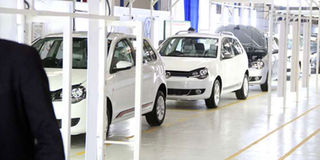Kenya seeks to double local car assembly by 2025

Volkswagen Polo Vivo cars at the Kenya Vehicles Manufactures production line in Thika.
Kenya is banking on its national automotive policy to bolster the industry, seeking to double production in the next four years and reduce dependency on second-hand imported vehicles.
The policy, introduced in 2019 and adopted by the Cabinet, envisions increasing the number of vehicles manufactured locally and creating more jobs in vehicle assembly.
The policy provides an enabling environment for automotive industry players to reach their full potential and position Kenya as a major automotive manufacturer, said Industrialisation Trade and Enterprise Cabinet Secretary Betty Maina.
She spoke at an Associated Vehicle Assemblers (AVA) plant in Miritini, Mombasa County, noting that the automotive sector is critical in Kenya’s plans to increase manufacturing and that President Uhuru Kenyatta is passionate about it.
“This policy has the ambition of creating a very vibrant auto sector in Kenya. It used to be there a while back but it has faced challenges, especially with the importation of used vehicles,” she said.
“What we are witnessing is a turnaround in factories like AVA, and it gives us confidence that Kenyans can find quality products available locally.”
The policy targets challenges such as lack of dedicated legal, institutional and regulatory frameworks, imports of parts by franchise holders instead of procuring from local parts manufacturers, and an influx of used vehicles.
It also seeks to make the domestic automotive industry more competitive.
Globally, the industry has been a pillar of industrialisation for many economies and a key driver of macroeconomic growth and technological advancement.
But Kenya’s automotive policy notes a mismatch between training and the required industry skills, with the curriculum not in tandem with modern technologies.
This creates a skills gap that forces manufacturers and entrepreneurs to train workers on the job training, thus increasing production costs.
The policy is being converted into a sessional paper that will be presented to Parliament.
Since it was developed, automotive investors have grown more confident and are expanding operations in local assembly of vehicles and motorcycles.
The policy, the CS said, was adopted by the Cabinet earlier this year and some of its facets are beings implemented already.
“The policy is represented by legal notices 84 of 2019 and 112 of 2020. These notices have a prescription of local content - that goods or parts of vehicles must be sourced in Kenya,” she said.
“What we will witness today is the assembly of completely knocked down kits. They come disassembled, ready for assembling.”
To build local capacity, the ministry required that some of the parts, such as tyres, batteries and springs, be made in Kenya.
“Our dream with this policy is that we will have more and more of these parts being made in Kenya in the next 10-15 years, since what drives the industry is markets and these markets are generated regionally and locally,” the CS explained.
AVA is the largest vehicle manufacturer in Kenya, working for brands such as Mitsubishi Motors, Scania, Tata, Hino and Toyota. The company previously also assembled Peugeot, Fiat, Iveco and Volvo (trucks).
It was fully taken over by Simba Corporation in 2017 from a joint venture with Marshalls East Africa and refurbished for about Sh4 billion. The company recently started assembling pickups for Toyota and Mahindra at the Mombasa plant.
AVA assembled more than 3,000 vehicles last year and hopes to double the number by the end of this year, said operations manager Moses Abiero.
This year, he said, it will deliver more than 300 vehicles to Kenya’s disciplined forces at an average cost of Sh2.5 million and manufacture 3,600 16-seater matatus.
“We have a rolling order from the police service to manufacture 132 Mahindra police cars. This comes as a benefit to the service, who typically import their vehicles,” Mr Abiero said.
AVA employs more than 370 people.





